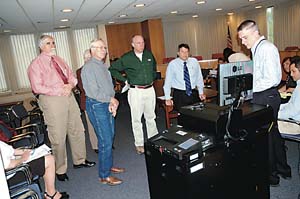|

|
Dan Hust | Democrat SULLIVAN COUNTY MANAGEMENT Information Systems Chief Information Officer Lorne Green, right, demonstrates the Sequoia Imagecast electronic voting machine to local officials at the Government Center. From the left are Mamakating Supervisor Bob Fiore, Fremont Supervisor Jim Greier, Fallsburg Supervisor Steve Levine, Legislator Ron Hiatt, Republican Elections Commissioner Rodney Gaebel and Management and Budget Commish Josh Potosek.
|
Mandating voting machines fraught with problems
By Dan Hust
MONTICELLO — Sullivan County’s Board of Elections is getting ready for one big headache.
And voters countywide may also get stuck in what Republican Elections Commissioner Rodney Gaebel termed a “nightmare.”
“If you really care about your vote, request an absentee ballot, because this is crazy,” he told a recent gathering of the Sullivan County Council of Governments.
That sentiment was directed toward handicapped voters in the county, but it may soon apply to anyone who finds themselves wrestling with the county’s 51 new electronic voting machines. The new electronic voting system has been mandated by the state for all counties.
Called the Sequoia Imagecast, it’s basically a computer in a large lockbox, complete with viewing screen, keypad, printer and scanner.
Gaebel and Democratic Deputy Elections Commissioner Faith Kaplan recently introduced the machine to local officials, with Management Information Systems chief Lorne Green showcasing the mechanisms that will allow the physically handicapped to vote without assistance.
Indeed, that’s the idea behind these machines – to offer equal, nondiscriminatory access to polling equipment, regardless of a person’s particular disability.
But in the process, said officials, New York State is actually making it tougher for people to vote.
Though the cost was funded by the federal government, Sullivan County was required by the state to purchase one $11,500 machine for each of its 48 polling locations, plus two spares and one demonstration model. (The feds, however, are not paying for costs to transport the machines to polling sites or the electricity required to operate them.)
They will debut in the general election this November, though only people who need or request to use them will have access to the Imagecasts.
By next year, however, Sullivan County’s 43,000 registered voters will have to use them, as they’ll replace the “old-fashioned” lever-operated machines.
Those with an aptitude for electronics will probably feel right at home and breeze through the on-screen or audio prompts. Those without such an affinity will likely struggle – indeed, some of the senior citizens who comprise the majority of elections inspectors have already told officials they won’t continue due to the complexity of not only operating but teaching others to operate the machines.
However, the largest concern lies with handicapped voters, whom Green said will have to spend between 40 and 50 minutes to complete a full ballot – at a minimum.
The disbelief that permeated the room after that announcement dissipated once Green demonstrated a typical assisted voting session.
Set up to respond to finger or breath commands, the Imagecast can silently or verbally guide voters through their choices. Once complete, the machine takes up to two minutes to print the completed ballot for voters to review.
No curtains will be employed, unlike the current lever machines. Instead, privacy screens will be erected to shield the monitor from view. Privacy sheaths will also be provided to cover printed ballots.
When voters are satisfied their choices have been correctly entered, they must pass the ballot through a scanner. If the scan is successful (it had to be done twice during the demonstration), the machine keeps the ballot in an internal bin.
If voters note any mistakes on the printed ballot, however, they must discard it in a special slot on the machine. Such incorrect ballots are not scanned but fed into a different bin – though it’s close enough to the other storage area that elections officials fear some inspectors may send the wrong ballots to the Board of Elections for counting.
“All I can say is the state certified what was available to the counties for use,” noted Gaebel. “We had no choice.”
“I’m anticipating a lot of problems,” Legislator Leni Binder bluntly assessed.
Gaebel agreed: “My feeling is the largest majority of handicapped people will still choose to vote via absentee ballot in the privacy of their own homes. Nevertheless, we have to do this.”
About the only positive sentiment that could be found at the demonstration originated with Mamakating Supervisor Bob Fiore.
“Like anything else,” he optimistically related, “it’ll get better.”
For more information on the machines or to get a demonstration, call the Board of Elections at 794-3000, ext. 5024.
|



